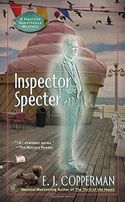
 “Where do you get your ideas?”
“Where do you get your ideas?”
Writers get this question all the time. It’s an honest question asked by readers and in some cases interviewers who want to know about the process. I understand the impetus behind the question.
I just don’t have an answer for it.
The fact is, if I had a formula, a foolproof means of finding a good idea for a novel, I could get one whenever I wanted and this job would be… well, I’d still have to write the book, so “easy” might be something of an overstatement. But it wouldn’t be as hard, by a discernible margin.
My latest book, INSPECTOR SPECTER, is the sixth in the Haunted Guesthouse series. You’d think after five other books with the same characters it would be a struggle to find something for them to do. Not at all. This one came from the characters, which is the best place to start.
Alison Kerby owns a guesthouse on the Jersey Shore and it happens to have two ghosts haunting it. They get along okay, but that’s a long story all by itself. She also has a PI license, and in this book is asked by Lt. Anita McElone (rhymes with “macaroni”), with whom she has sort of a grudging professional relationship, to use her “ghosty connections” to solve the murder of McElone’s ex-partner, whom we met in another book in the series.
Because the story came from the characters, I could concentrate on how it affects their relationships. I knew the story would be workable because it was about the people readers have gotten to know, and new readers will find accessible even without reading the other books in the series (although would that be so bad?).
For those who want to be published writers, I can’t offer a simple way to get an idea. They tend to hit when you least expect them, so the best piece of advice is not to expect one and see how that goes. I have gotten book ideas in the shower (it’s best not to picture some of these), while trying to fall asleep, while walking the dog and while watching baseball on television. The baseball ones don’t tend to work very well, as my concentration is completely elsewhere. Some of the others haven’t been bad.
The trick, really, is to be able to tell a good idea—a sustainable one that will make it through a whole book and not just up to Chapter Six—from a bad idea (the opposite of that). And that is where some experience can actually be helpful.
Consider this: When you get a story idea, can you image what the middle of the book will be like? Beginnings are easy; they are the story idea all by themselves. Endings should take care of themselves because a premise demands a resolution. What about the middle? Can you think of a really impressive, important, fun scene that’s going to happen somewhere about halfway through your story? If so, you might have a workable idea on your hands.
Who are your characters? One common mistake with writers is that we get a terrific idea for a twisty plot, but we don’t know who’s going to populate the book. Remember that you character is the reason for the story—if it’s not specific to the personality you’re creating, your story could happen to anybody, and your reader won’t care as much about what happens. Think of the person you most want in that situation, and then maybe create a character who’s the opposite of that.
If you’re trying to start a series, think hard about sustainability. Sure, you have a great idea for this book, but if you want to bring the character back time and again, is it plausible that s/he could get into another situation worth writing about? Do you have more than one premise in your head? Do you know what you’ll do for Book #2? I once wrote a series about the owner of a one-screen movie theater that showed only comedies.
Who solved crimes. Try coming up with more than one story idea for that series sometime. It can be a challenge. (Although that series was a lot of fun to write.)
How interested are you in the story? How charged up? If you’re not desperate to get this book out before someone else hits on the same idea, if you don’t feel moved to get to the keyboard right now and start pounding it out, maybe this isn’t The Idea.
If you’re writing something because you think it’s going to be commercial, because that’s the trend in publishing right now, because hey, hot teenage vampires from Dubuque are what it’s all about now and you can make a movie deal, stop. You’ll write something even you don’t want to read, and besides, by the time your book is ready to be shown to editors, the trend will be talking scarecrows who fight crime and search for love in the big city.
Don’t write something because it’ll sell. Write something that will sell because you believe in it.
There are good ideas and bad ideas. I’ve gotten both. Hopefully, Inspector Specter turns out to be one of the good ones, but ultimately you get to decide that when you read the book. In your own writing, you do your best and hope the readers agree with your assessment.
E.J. Copperman is the author of the Haunted Guesthouse mystery series from Berkley Prime Crime, continuing with INSPECTOR SPECTER December 2.


No Comments
Comments are closed.